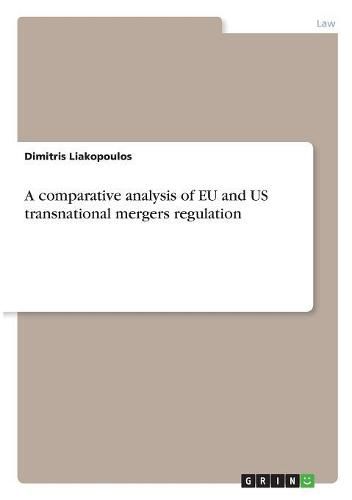Readings Newsletter
Become a Readings Member to make your shopping experience even easier.
Sign in or sign up for free!
You’re not far away from qualifying for FREE standard shipping within Australia
You’ve qualified for FREE standard shipping within Australia
The cart is loading…






This title is printed to order. This book may have been self-published. If so, we cannot guarantee the quality of the content. In the main most books will have gone through the editing process however some may not. We therefore suggest that you be aware of this before ordering this book. If in doubt check either the author or publisher’s details as we are unable to accept any returns unless they are faulty. Please contact us if you have any questions.
Document from the year 2017 in the subject Law - Civil / Private / Trade / Anti Trust Law / Business Law, grade: A, language: English, abstract: The major problem associated with the regulation of transnational mergers, which affect several national markets, is the allocation of jurisdiction. Each country concerned may wish to exert jurisdiction and apply its national competition law to regulate the anti-competitive effects a merger may have in its territory. However, this approach may lead to risks of inconsistent decisions regarding the legality of mergers. Indeed, the national competition laws applied by the regulating authorities may diverge in several aspects, which raise the likelihood of inconsistency. The authors advocates the creation of an international merger control framework (IMCF) for the regulation of transnational mergers. This framework will rest on an informal and a formal pillar. The former includes non-legally binding competition principles. Consistency of these principles with the concepts of legitimacy and efficiency, as well as the presence of peer reviews and assistance programmes, should lower the risk of non-implementation. The formal pillar includes bilateral cooperation agreements which apply to merger affecting the countries which have concluded the agreements. As essential pre-condition for the application of bilateral agreements, the level of cooperation achieved by such agreements should be at least equal to that ensured by the informal pillar. The last part of the study addresses and examines the long and complex processes in merger and acquisition (M&A) transactions. M&A arbitration faces certain difficulties during the transaction. Such difficulties the author seeks to underline. Two main problems of arbitration in M&A transactions, particullarly, have been covered. Firstly, the problem of consent in consolidation of parallel proceedings during M&A transactions, and, secondly parties’ consent that validate arbitration agreem
$9.00 standard shipping within Australia
FREE standard shipping within Australia for orders over $100.00
Express & International shipping calculated at checkout
This title is printed to order. This book may have been self-published. If so, we cannot guarantee the quality of the content. In the main most books will have gone through the editing process however some may not. We therefore suggest that you be aware of this before ordering this book. If in doubt check either the author or publisher’s details as we are unable to accept any returns unless they are faulty. Please contact us if you have any questions.
Document from the year 2017 in the subject Law - Civil / Private / Trade / Anti Trust Law / Business Law, grade: A, language: English, abstract: The major problem associated with the regulation of transnational mergers, which affect several national markets, is the allocation of jurisdiction. Each country concerned may wish to exert jurisdiction and apply its national competition law to regulate the anti-competitive effects a merger may have in its territory. However, this approach may lead to risks of inconsistent decisions regarding the legality of mergers. Indeed, the national competition laws applied by the regulating authorities may diverge in several aspects, which raise the likelihood of inconsistency. The authors advocates the creation of an international merger control framework (IMCF) for the regulation of transnational mergers. This framework will rest on an informal and a formal pillar. The former includes non-legally binding competition principles. Consistency of these principles with the concepts of legitimacy and efficiency, as well as the presence of peer reviews and assistance programmes, should lower the risk of non-implementation. The formal pillar includes bilateral cooperation agreements which apply to merger affecting the countries which have concluded the agreements. As essential pre-condition for the application of bilateral agreements, the level of cooperation achieved by such agreements should be at least equal to that ensured by the informal pillar. The last part of the study addresses and examines the long and complex processes in merger and acquisition (M&A) transactions. M&A arbitration faces certain difficulties during the transaction. Such difficulties the author seeks to underline. Two main problems of arbitration in M&A transactions, particullarly, have been covered. Firstly, the problem of consent in consolidation of parallel proceedings during M&A transactions, and, secondly parties’ consent that validate arbitration agreem